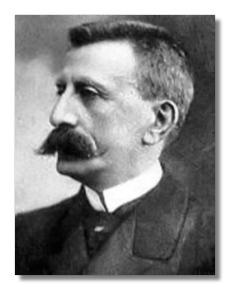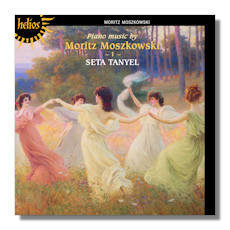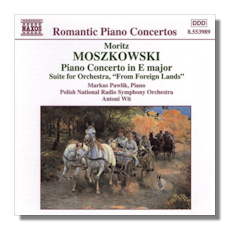
The Internet's Premier Classical Music Source
Related Links
-
Find CDs & Downloads
Amazon - UK - Germany - Canada - France - Japan
ArkivMusic - CD Universe
Find DVDs & Blu-ray
Amazon - UK - Germany - Canada - France - Japan
ArkivMusic-Video Universe
Find Scores & Sheet Music
Sheet Music Plus -
Recommended Links
Site News
Moritz Moszkowski

(1854 - 1925)
Moritz Moszkowski (August 23, 1854 - March 4, 1925) was born in Breslau, Prussia (what is now Wroclaw, Poland) into a Jewish family of German descent. He studied with the outstanding piano teacher Theodor Kullak, and was instructed in composition by Friedrich Kiel. He was active in Berlin for many years, became very friendly with Xaver and Philipp Scharwenka, and played four-hand pieces with Franz Liszt. Moszkowski's also became a prominent pedagogue whose pupils included Vlado Perlemuter, Josef Hofmann, Wanda Landowska, Thomas Beecham, Joaquín Nin, Frank Damrosch, Ernest Schelling, and Joaquín Turina. He had a successful career as a composer, teacher, concert pianist and conductor, though his health deteriorated in the 1890s and he became reclusive.
Moszkowski music is brilliant, and often showy, as much of it was composed to demonstrate his pianistic abilities. He wrote over two hundred small-scale piano pieces, including his world-famous Serenade (Sérénata), Op. 15. His large-scale works include a symphony subtitled Jeanne d'Arc, Op. 19 (1876), the Violin Concerto in C Major, Op. 30 (1883), three orchestral suites (Opp. 39, 47 & 79), and perhaps his best-known orchestral work the Piano Concerto in E Major, Op. 59 (1898).

Recommended Recordings
Piano Music
- Tarantella, Barcarolle from Offenbach's "Tales of Hoffmann", Valse mignonne, Characteristic Pieces, 4 Pieces, Poeme de Mai, Sérénata, Près de Berceau, Chanson Bohème from Bizet's "Carmen"/Hyperion Helios CDH55141
-
Seta Tanyel (piano)
- Morceaux, Isolde's death from Wagner's "Tristan and Isolde", Grande Valse de Concert, Fantaisie Impromptu, Études de Concert/Hyperion Helios CDH55142
-
Seta Tanyel (piano)
- Fantasie "Hommage à Schumann", Morceaux, Barcarolle, Étude, Scherzo-Valse/Hyperion Helios CDH55143
-
Seta Tanyel (piano)
- Piano Concerto in E Major, Op. 59 w/ Paderewski/Hyperion CDA66452
-
Piers Lane (piano), Jerzy Maksymiuk/BBC Scottish Symphony Orchestra
- Piano Concerto in E Major, Op. 59; Aus aller Herren Länder, Op. 23 /Naxos 8.553989
-
Markus Pawlik (piano), Antoni Wit/Polish National Radio Orchestra, Katowice
- Violin Concerto in C Major, Op. 30, Ballade in G minor, Op. 16 #1 w/ Karlowicz/Hyperion CDA67389
-
Tasmin Little (violin), Martyn Brabbins/BBC Scottish Symphony Orchestra















